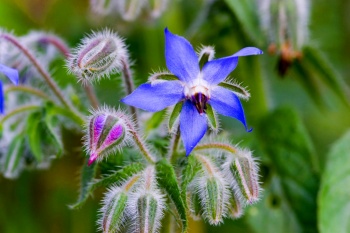Borage
Other Names: Bee Plant, Beebread, Borage Flower, Borage Leaf, Borage Oil, Borage Seed Oil, Borago, Borago officinalis, Borraja, Bourrache, Bourrache Commune, Burage, Burrage, Common Borage, Common Bugloss, Cool Tankard, Feuille de Bourrache, Fleur de Bourrache, Huile de Bourrache, Huile de Graines de Bourrache, Langue de Bœuf, Ox's Tongue, Pain-des-Abeilles, Talewort, Starflower, Starflower Oil, Liu Li Ju, 琉璃苣, 琉璃苣, 玻璃苣, لسان الثور, حمحم, Borač, Boražina, Volujsko uho, Brotnák, Bořeč, ボリジ, ルリヂサ,Boriji, Ruridisa, ದೊಡ್ಡಪತ್ರೆ, 보리지, Poriji, Doddapatre
لِسَان الْثَوْر, حِمْحِم, Lisaan ath-Thaur, Lisan al-Thaur, Огуречная трава, Огуречник аптечный, Ogurechnaya trava, Ogurechnik aptechnyj Himhim, Hamham, Berroya, Borrai
Borage is a plant. Its flowers and leaves, as well as the oil from its seeds are used as medicine.
See also : Borage Seed Oil
Special Precautions of Borage
- Potentially unsafe. Borage plant parts such as flowers, leaves and seeds may contain pyrrolizidine alkaloids that can damage the liver and may be a cause of cancer if taken in excess amount and prolonged period.
- Possibly safe. Processed Borage seed oil that are certified to be pyrrolizidine alkaloid free are considered to be safe both for topical application and by ingestion.
- May cause allergic reaction. Borage because of its hairy or bristly leaves and stems may cause skin allergic reaction to sensitive people..
- Children: Borage seed oil that are certified as pyrrolizidine alkaloid free can be used safely to children.
- Pregnancy and breast-feeding: There are no sufficient studies done to determine the safe use of Borage herbal medicine during pregnancy. Although Borage has been used to promote milk production for breast feeding mothers, it is still best to consult your pediatrician or a competent health practitioner before use.
- Liver disease: Borage products may contain pyrrolizidine alkaloids that can cause or worsen existing liver diseases.
- Just like in any other herbal medicines, moderation of use is recommended. Prolonged use is discouraged.
Benefits and uses of Borage are
Borage is also loaded with macronutrients, including vitamins A and C, niacin, thiamin, riboflavin and choline, and also contains proteins, fiber, minerals and other plant compounds. Vitamin C in borage makes it valuable for its anti-oxidant property while vitamin A is known to promote good eye sight.
- Diuretic. Borage is used to remove excess liquid from the body, and is believed to help remove toxins.
- Sudorific. Borage is known to contain choline that stimulates the glands that produce sweat and cools the body. Because of this cooling property of borage, it is used to treat fever, bronchitis, colds and flu.
- to treat arthritis. Borage is rich in essential fatty acids that help to relieve pain associated with arthritis.
- sedative action. Borage contains niacin or nicotinic-acid that may have positive effects against anxiety, stress and nervousness.
- Another disease that may be caused by lack of fatty acids is macular degeneration. Borage may also be used for the prevention and treatment of macular degeneration.
- being studied on its effect to breast cancer.
- Rich in omega-6 fatty acid that is found to have positive effect against breast tumor growth.
- Used in the treatment of prostate gland inflammation such as prostatitis.
- Promotes digestion and helps to relieve stomach aches such as gastritis and irritable bowel syndrome.
- Used to treat skin infections and inflammation such as dermatitis, eczema, psoriasis, pimples, herpes, nail fungus, etc.
- A poultice of crushed Borage leaves is also used to relieve insect bites and stings, reduce swelling and bruising and is also helpful for clearing up boils and rashes.
- Borage tea is also used to promote milk production for lactating mothers
- Borage is also used to treat hangover
